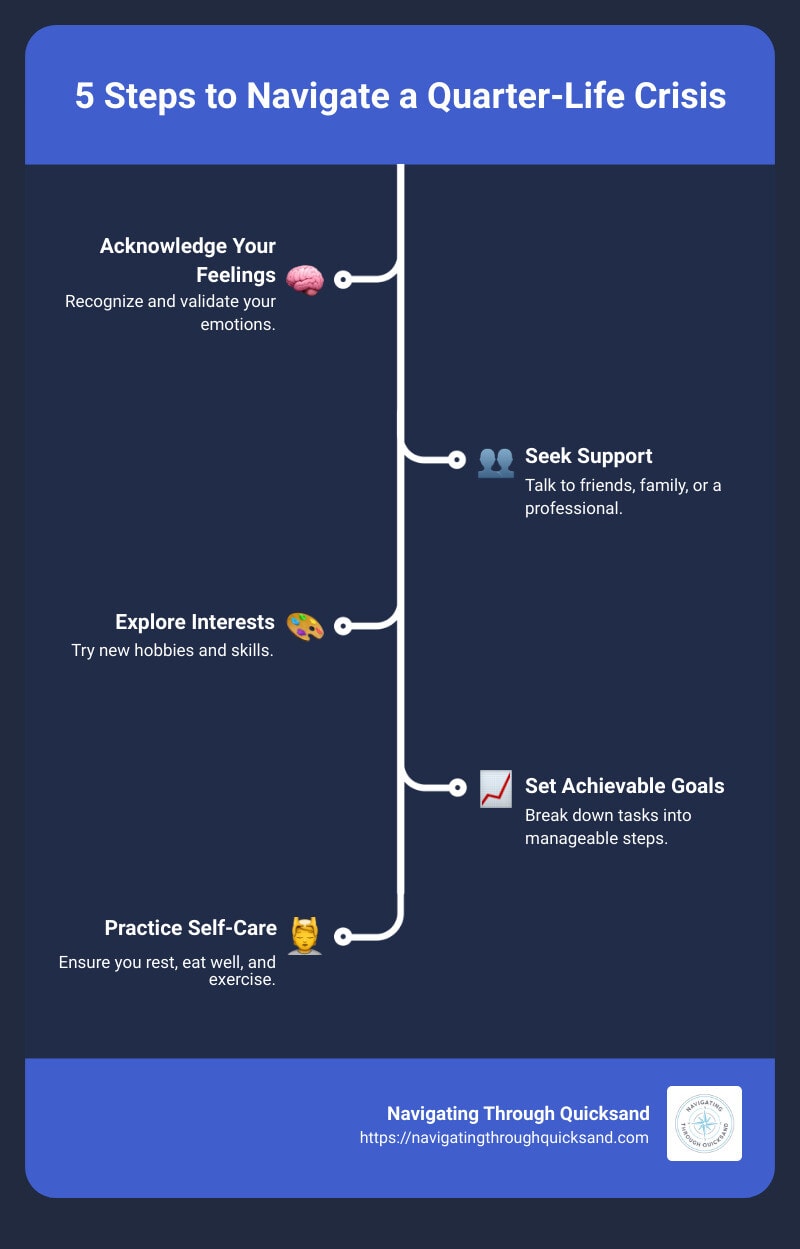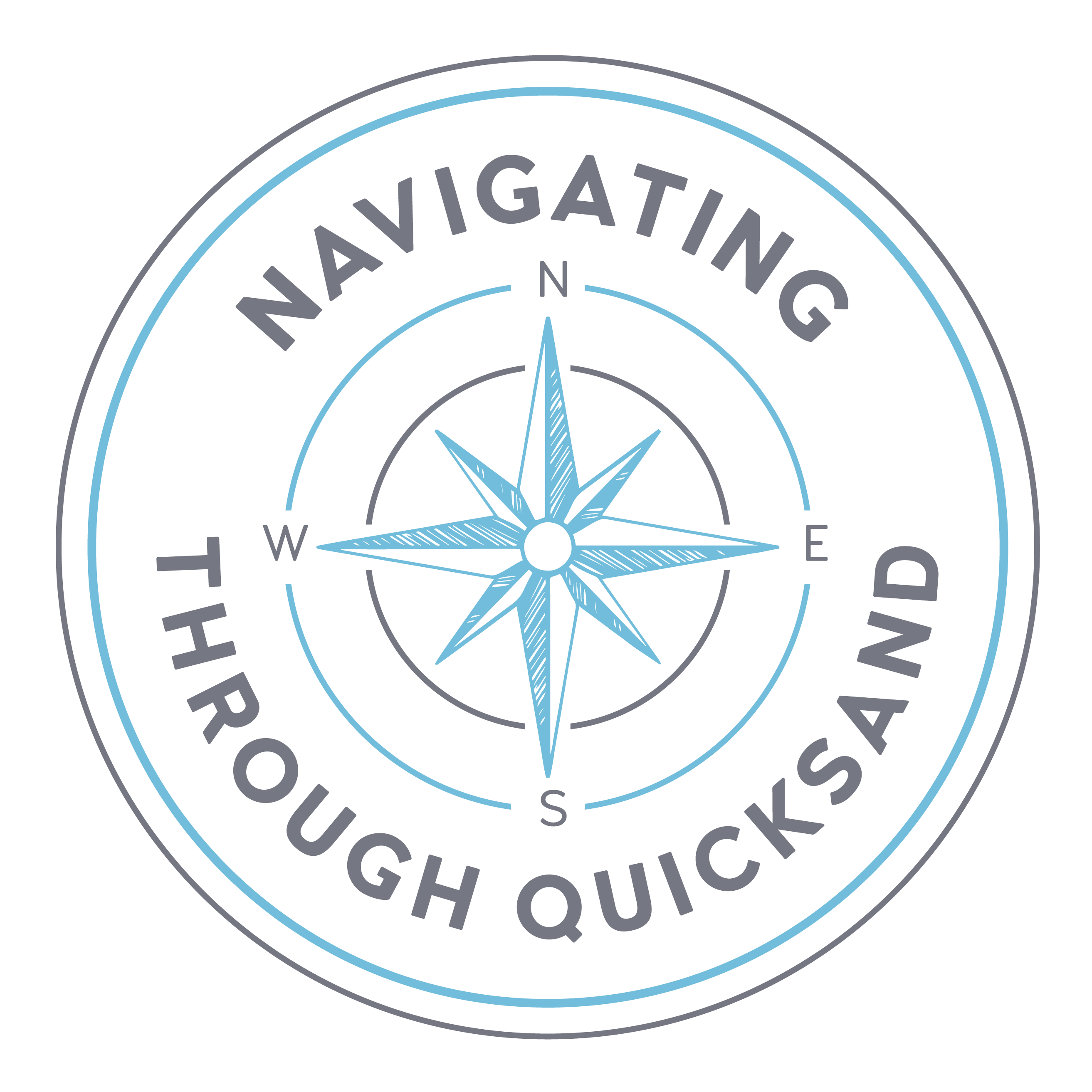Navigating the Quarter-Life Crisis: Finding Your Way in Young Adulthood
Navigating quarter life crises as a young adult can feel like you’re stuck in quicksand. You might be questioning your career path, feeling lost in your relationships, or struggling to find a sense of purpose. This period of young adulthood can bring about deep existential questioning, much like a mid life crisis, making you feel unanchored and unsure of your next steps.
How to Navigate a Quarter Life Crisis:
- Acknowledge your feelings.
- Seek support from friends, family, or a professional.
- Explore new interests and hobbies.
- Set small, achievable goals.
- Practice self-care regularly.
It’s normal to feel overwhelmed and adrift at this stage in your life. Research suggests that a quarter-life crisis is a common phenomenon, with 75% of young adults experiencing it. The good news is that this crisis can be a catalyst for personal growth and self-findy.

Table of Contents
Understanding a Quarter Life Crisis
Identity Exploration
During a quarter-life crisis, many young adults experience a profound phase of identity exploration. This is a time when you might start questioning who you are and what you truly want from life. You might ask yourself:
- Am I in the right career?
- Do my relationships reflect my values?
- What are my passions and interests?
These questions are crucial as they present an opportunity for self-discovery and personal growth during this uncertain phase. Journaling and visualization can be very helpful in this process. Write down your thoughts and imagine different future scenarios to see which ones resonate with you.
Shifting Priorities
As you steer this period, your priorities may shift. What once seemed important might no longer hold the same value. This shift can be unsettling but is a natural part of growth. You might find yourself valuing:
- Personal fulfillment over financial gain
- Authentic relationships over social status
- Work-life balance over career advancement
It’s essential to accept these changes and understand that your evolving priorities are a sign of maturity.
Disillusionment
Disillusionment is a common feeling during a quarter-life crisis. You might realize that the path you’ve been on doesn’t lead to the happiness or success you envisioned. This can be a tough pill to swallow, but it also offers an opportunity to reassess and redirect your life.
Consider the story of Smriti Iyer, who transitioned from being an architect to a pastry chef. Despite societal and familial pressures, she chose to follow her passion. Her journey highlights the importance of aligning your career with your true interests and values.
Fear of the Future
The fear of the future can be overwhelming. Questions like “Where will I be in five years?” or “Will I ever find my dream job?” can cause significant anxiety. To manage this fear, focus on what you can control—your actions and decisions today. Setting small, achievable goals can help you build confidence and create a sense of direction.
Pressure and Comparison
Societal pressure and comparison can exacerbate a quarter-life crisis for a young adult. Quarter-life crises often intensify due to societal pressure and comparison. Social media often highlights the successes of others, making you feel inadequate. What you see online is a curated version of reality. Everyone has their struggles, even if they’re not visible.
According to research, 56% of young adults want advice on navigating their quarter-life crisis but don’t know where to turn. It’s crucial to focus on your unique journey and avoid comparing yourself to others.
Navigating a quarter-life crisis involves understanding these elements and using them as stepping stones for personal growth. In the next section, we’ll dig into how acknowledging your feelings can be the first step towards overcoming this challenging period.
Acknowledge Your Feelings

Acknowledging your feelings is the first crucial step in navigating a quarter-life crisis. It’s normal to feel lost, confused, and even anxious during this period. Understanding that these feelings are common can bring a sense of relief.
Normal Feelings
Dr. Joel Frank emphasizes that feeling uncertain and overwhelmed in your 20s is perfectly normal. Many young adults experience these emotions as they transition from adolescence to adulthood. You might feel:
- Lost: Unsure about your career path or life direction.
- Inadequate: Comparing yourself to peers and feeling like you’re falling behind.
- Anxious: Worried about the future and your ability to succeed.
Recognizing that these feelings are part of a natural process can help you feel less isolated.
Self-Reflection
Self-reflection is a powerful tool for understanding your emotions. Take time to explore what you’re feeling and why. Some strategies for effective self-reflection include:
- Journaling: Write about your thoughts, feelings, and experiences. This can help you identify patterns and understand what truly matters to you.
- Alone Time: Spend time in solitude to think without external influences. This can help you connect with your inner self and gain clarity.
- Visualization: Imagine different future scenarios and consider how each makes you feel. This can provide insights into your desires and goals.
Validation
It’s essential to validate your feelings. Accept that what you’re experiencing is real and significant. Talking to friends, family, or a mentor can provide external validation and support. Dr. Frank suggests that expressing your feelings without judgment is crucial. He says, “You’re not alone, and expressing these feelings without judgment is OK.”
Dr. Joel Frank’s Insights
Dr. Joel Frank offers valuable advice for navigating a quarter-life crisis. He emphasizes the importance of self-compassion and patience. According to Dr. Frank, “Sometimes, just knowing someone will understand can be a huge relief.” Reaching out to others who have gone through similar experiences can provide comfort and guidance.
In summary, acknowledging your feelings involves recognizing that they are normal, engaging in self-reflection, seeking validation, and considering professional insights. These steps can help you feel more grounded and ready to steer the challenges of a quarter-life crisis.
Next, we’ll explore how seeking support can provide additional strength and perspective during this challenging time.
Seek Support
Navigating a quarter-life crisis can feel overwhelming, but you don’t have to go through it alone. Seeking support from friends, family, and professionals can make a significant difference. Here are some ways to get the support you need:
Friends and Family
Reaching out to those closest to you as a young adult can be a great source of comfort and strength. Talk to the people you trust the most about how you are feeling. While they may not have all the answers, they can offer comfort, advice, and feedback.
- Open Up: Share your feelings honestly. Let them know what you’re going through.
- Listen: Sometimes, just having someone listen can be incredibly validating.
- Stay Connected: Regularly check in with your support network to keep those bonds strong.
Social Media
Social media can also be a useful tool for support. However, it’s important to use it wisely.
- Join Support Groups: Online communities can connect you with others going through similar experiences. These groups can provide a sense of solidarity and shared understanding.
- Limit Comparison: Social media often shows the highlights of people’s lives. Avoid comparing yourself to others, as this can exacerbate feelings of inadequacy.
Professional Help
Seeking professional help can provide a more structured and objective form of support.
- Therapy: A mental health professional can offer a safe, non-judgmental space to explore your feelings and challenges. Therapy can help you gain new insights and coping strategies.
- Counseling: Career or life counseling can offer specific guidance on navigating your professional and personal goals.
Dr. Joel Frank notes, “Sometimes, the guidance of a trained therapist or counselor can provide the perspective and tools needed to steer through this challenging time effectively.”
Therapy
If you find that your feelings of distress are persistent, it might be time to consider therapy. A therapist can help you:
- Understand Your Emotions: Gain deeper insights into why you feel the way you do.
- Develop Coping Strategies: Learn techniques to manage stress, anxiety, and other emotions.
- Set Goals: Work on setting and achieving personal and professional goals.
In summary, seeking support is a crucial step in navigating a quarter-life crisis. Whether you turn to friends, family, social media, or professional help, having a support system can provide the strength and perspective you need to move forward.
Next, we’ll explore how to engage in self-reflection to better understand your interests and goals.
Explore Your Interests

Exploring your interests is a vital part of how to steer a quarter life crisis. This process can help you find what truly makes you happy and fulfilled. Here are some ways to dive into your interests:
Hobbies
Engaging in hobbies during your free time can be a great way to explore what you enjoy and alleviate feelings of despondency and boredom. Hobbies provide a break from daily stresses and offer a sense of accomplishment.
- Try New Activities: Experiment with different hobbies to see what you like. This could be anything from painting to hiking.
- Reconnect with Old Interests: Think back to activities you enjoyed as a child or teenager. Reconnecting with these can bring joy and a sense of nostalgia.
- Join Clubs or Groups: Find local or online groups that share your interests. This can also help you meet new people and expand your social circle.
New Skills
Learning new skills can be both exciting and empowering. It can open up new opportunities and help you feel more in control of your future.
- Take Classes: Whether online or in-person, classes can help you gain new skills. Websites like Coursera or local community colleges offer a variety of courses.
- Read Books and Articles: Dive into topics that interest you. Reading can provide both knowledge and inspiration.
- Practice Regularly: Consistency is key. Set aside time each week to practice and improve your new skills.
Career Change
If you’re unhappy with your current career, it might be time to consider a change. This can be daunting, but also incredibly rewarding.
- Self-Assessment: Reflect on what you enjoy and what you’re good at. Tools like O*NET can help you understand different career options.
- Research: Look into different fields and industries. Understand the qualifications and skills required.
- Networking: Talk to people in the careers you’re interested in. They can offer valuable insights and advice.
- Start Small: You don’t have to make a drastic change overnight. Consider starting with a side project or part-time work in your field of interest.
Values
Understanding your values is crucial in making decisions that align with who you are. This can lead to a more fulfilling and authentic life.
- Reflect: Take time to think about what matters most to you. Is it family, creativity, financial stability, or something else?
- List Your Values: Write down your top values. This can help clarify what you want to prioritize in your life.
- Align Your Actions: Ensure that your daily actions and long-term goals align with your values. This can lead to greater satisfaction and less internal conflict.
Exploring your interests is not just about finding what you like to do; it’s about understanding yourself better. This self-awareness can guide you in making decisions that lead to a happier and more fulfilling life.
Next, we’ll look at how to set small, achievable goals to help you steer through your quarter-life crisis.
Set Small, Achievable Goals
Setting small, achievable goals is a powerful way to steer a quarter-life crisis. It helps break down overwhelming tasks into manageable steps, boosting your confidence and leading to small victories that pave the way for long-term success.
Manageable Tasks
Start by breaking big goals into smaller, more manageable tasks. This approach makes large projects feel less daunting.
- Daily To-Dos: Create a daily to-do list with 3-5 tasks. This keeps you focused and organized.
- Weekly Goals: Set weekly goals to track your progress. These should be measurable and specific.
- Monthly Milestones: Identify monthly milestones to keep your momentum going. Celebrate when you reach them.
Confidence Boost
Achieving small goals can significantly boost your confidence. Each success, no matter how small, builds your self-esteem and motivates you to keep going.
- Track Progress: Keep a journal or use an app to track your progress. Seeing how far you’ve come can be incredibly motivating.
- Celebrate Wins: Celebrate your small victories. Whether it’s treating yourself to something nice or simply acknowledging your hard work, recognition is important.
Small Victories
Small victories are essential in building momentum. They provide a sense of accomplishment and keep you motivated.
- Daily Wins: Focus on daily wins, like completing a task or learning something new.
- Reflect: Spend a few minutes each day reflecting on what you’ve achieved. This helps reinforce positive behavior.
- Share: Share your victories with friends or family. Their encouragement can boost your morale.
Long-Term Goals
While small goals are important, keeping an eye on long-term goals ensures you’re moving in the right direction.
- Vision Board: Create a vision board to visualize your long-term goals. This can serve as a daily reminder of what you’re working towards.
- SMART Goals: Use the SMART goal framework to set Specific, Measurable, Achievable, Realistic, and Time-bound goals.
- Review and Adjust: Regularly review your goals and adjust them as needed. Life changes, and your goals might need to adapt too.
Setting small, achievable goals helps you steer a quarter-life crisis by providing structure and direction. These goals offer a clear path forward, making it easier to tackle challenges and achieve your dreams.
Next, we’ll explore the importance of practicing self-care during this transitional period.
Practice Self-Care

Practicing self-care is essential when navigating a quarter-life crisis. It helps maintain your well-being and provides the foundation needed to tackle life’s challenges. Here’s how to focus on rest, nutrition, exercise, happiness, and tranquility:
Rest
Getting enough rest is crucial for your physical and mental health. Lack of sleep can lead to stress, anxiety, and poor decision-making.
- Sleep Schedule: Stick to a regular sleep schedule. Go to bed and wake up at the same time every day.
- Relaxation Techniques: Practice relaxation techniques like deep breathing or meditation before bed.
- Comfortable Environment: Ensure your sleeping environment is comfortable, dark, and quiet.
Nutrition
Eating well fuels your body and mind, helping you stay energized and focused.
- Balanced Diet: Aim for a balanced diet rich in fruits, vegetables, lean proteins, and whole grains.
- Hydration: Drink plenty of water throughout the day.
- Mindful Eating: Practice mindful eating by paying attention to what and how you eat. Avoid eating when stressed or distracted.
Exercise
Regular exercise boosts your mood, reduces stress, and improves overall health.
- Routine: Create a regular exercise routine that you enjoy. It could be jogging, yoga, or dancing.
- Active Lifestyle: Incorporate physical activity into your daily life. Take the stairs, walk during breaks, or bike to work.
- Group Activities: Join a sports team or fitness class for social interaction and motivation.
Happiness
Engaging in activities that bring you joy can significantly improve your mental health.
- Hobbies: Dedicate time to hobbies and activities you love, whether it’s painting, reading, or gardening.
- Social Connections: Spend time with friends and family who uplift you. Positive social interactions can improve your mood.
- Laughter: Don’t forget to laugh. Watch a funny movie, attend a comedy show, or share jokes with friends.
Tranquility
Finding moments of tranquility helps reduce stress and promotes a sense of calm.
- Meditation: Practice meditation or mindfulness techniques to quiet your mind.
- Nature: Spend time in nature. Go for a hike, visit a park, or simply sit by a lake.
- Unplug: Take breaks from technology. Limit your time on social media and enjoy the present moment.
By prioritizing self-care, you create a strong foundation for navigating a quarter-life crisis. Rest, nutrition, exercise, happiness, and tranquility all contribute to a healthier, more balanced life.
Next, we’ll discuss how to steer a quarter-life crisis with mindfulness and self-understanding.
How to Steer a Quarter Life Crisis
Navigating a quarter-life crisis can feel overwhelming, but with the right strategies, you can steer through it effectively. Here’s a guide on how to steer a quarter-life crisis by practicing mindfulness, acknowledging your past, understanding yourself, embracing non-judgment, and enjoying the process.
Mindfulness
Mindfulness is about being present in the moment and aware of your thoughts and feelings without judgment. It helps you understand what’s happening in your mind and body.
- Daily Check-ins: Take a few minutes each day to check in with yourself. Ask, “How am I feeling right now?”
- Breathing Exercises: Practice deep breathing exercises to calm your mind. Inhale deeply for four counts, hold for four, and exhale for four.
- Mindful Activities: Engage in activities like yoga or meditation that promote mindfulness. Apps like Headspace can be helpful.
Past Acknowledgment
Understanding your past can provide insights into your current feelings and behaviors. Reflecting on past experiences can help you recognize patterns and make better choices moving forward.
- Journaling: Write about your past experiences, both good and bad. This can help you see how far you’ve come and identify areas for growth.
- Therapy: Consider talking to a therapist. They can help you explore your past and its impact on your present.
- Learn from Mistakes: Acknowledge past mistakes without judgment. Use them as learning opportunities.
Self-Understanding
Getting to know yourself is crucial during a quarter-life crisis. This involves understanding your values, strengths, and passions.
- Personality Tests: Take personality tests like the Myers-Briggs Type Indicator (MBTI) to gain insights into your personality.
- Value Lists: Make a list of your core values. What is most important to you in life?
- Strengths: Identify your strengths and how you can use them. Tools like StrengthsFinder can be useful.
Non-Judgment
Practicing non-judgment means accepting yourself and your experiences without criticism. It helps reduce stress and promotes a healthier mindset.
- Positive Self-Talk: Replace negative self-talk with positive affirmations. Instead of saying, “I’m not good enough,” say, “I’m doing my best.”
- Acceptance: Accept your feelings, even the uncomfortable ones. It’s okay to feel uncertain or scared.
- Compassion: Be compassionate with yourself. Treat yourself with the same kindness you would offer a friend.
Process Enjoyment
Enjoying the process means finding joy in the journey, not just the destination. This mindset can make navigating a quarter-life crisis more manageable.
- Celebrate Small Wins: Recognize and celebrate small achievements. Every step forward is progress.
- Hobbies and Interests: Engage in activities that bring you joy. Whether it’s painting, hiking, or cooking, make time for what you love.
- Stay Curious: Approach life with curiosity. Be open to new experiences and learning opportunities.
By incorporating mindfulness, acknowledging your past, understanding yourself, practicing non-judgment, and enjoying the process, you can steer through a quarter-life crisis with confidence and resilience.
Conclusion
Navigating a quarter-life crisis can feel like trudging through quicksand, but it’s important to remember that this period of uncertainty is also a time of growth and self-findy.
- Self-Compassion: Be kind to yourself. It’s normal to feel lost or overwhelmed. Practice self-compassion by acknowledging your feelings without judgment. It’s okay not to have all the answers right now.
- Growth Opportunity: Use this challenging time as an opportunity for growth. Reflect on your values and goals. Exploring new interests and setting small, achievable goals can provide clarity and direction.
- Clearer Sense of Self: Through self-reflection and exploration, you can gain a clearer sense of who you are and what you want. This journey of self-findy can lead to a more fulfilling and authentic life.
Contact us today at Navigating Through Quicksand! We offer expert coaching and workshops to help you steer these challenging times. You’re not alone in this journey. With the right support and mindset, you can turn your quarter-life crisis into a powerful catalyst for personal growth and a brighter future.
Stay resilient, keep exploring, and trust that you will find your way.
Frequently Asked Questions about Quarter Life Crisis
What to do if you’re having a quarter-life crisis?
- Find Solidarity: Recognize that you’re not alone. Many young adults face similar struggles. Talk to friends or join support groups to share experiences and gain perspectives.
- Explore New Skills: Use this time to find new interests. Take up hobbies or enroll in courses that excite you. This can open doors to new career paths or simply bring joy.
- Start a Side Hustle: If you’re unhappy with your current job, consider a side hustle. This can provide extra income and might even turn into a full-time passion.
- Degree Independence: Your degree doesn’t define your career. Many people, like Smriti Iyer who transitioned from architecture to pastry chef, find fulfillment in fields unrelated to their qualifications.
What are the 4 stages of the quarter-life crisis?
- Stress: Initially, you might feel overwhelmed by societal pressures and expectations. This can lead to anxiety about your future.
- Demotivation: As stress builds, you may lose motivation. Your job might feel unfulfilling, and you might question your life choices.
- Doubt: This stage involves intense self-doubt. You might wonder if you’re on the right path or if you’ve made the right decisions in your career and personal life.
- Intense Emotions and Isolation: Feelings of isolation can rise as you perceive others are doing better. This can lead to emotional highs and lows, making it crucial to seek support from loved ones or professionals.
How long does a quarter-life crisis last?
The duration of a quarter-life crisis varies. On average, it can last several months to a couple of years. However, individual experiences differ widely. Factors like personal resilience, support systems, and proactive steps can influence how long it takes to navigate this challenging period.
By understanding these stages and taking proactive steps, you can steer your quarter-life crisis more effectively. Next, we’ll dig into some practical strategies to help you steer through this phase with confidence.
Our Content
Our content is carefully created and edited by Ashley Gustafson to ensure that the content is accurate, reliable, and up-to-date. Navigating Through Quicksand, LLC is a trusted inspirational woman, inspirational speaker, and personal development coach in Massachusetts for confidence coaching programs, training sessions, athletic training for varsity teams, support for collegiate athletes, and more. Navigating Through Quicksand, LLC has empowered individuals with over 15 years of experience working with students and athletic teams from local communities.



